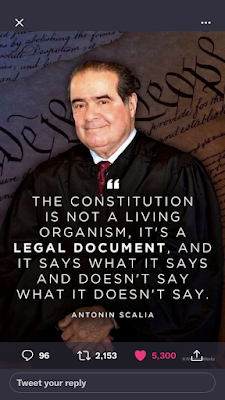Or, is it just the opposite?
By overruling Roe, the abortion issue will be returned to Congress and the states; and thus for the first time in almost 50 years, we the people will be able to exercise our right of democratic self-government by voting on the issue.
Here is an article by Prof. Josh Blackman
And here are some excerpts:
Chief Justice Roberts explored this concept in his Obergefell dissent:
Those who founded our country would not recognize the
majority's conception of the judicial role. They after all risked their
lives and fortunes for the precious right to govern themselves. They would never have imagined yielding that right on a question of social policy to unaccountable and unelected judges.
Justice Scalia made this point more forcefully in his Obergefell dissent:
Today's decree says that my Ruler, and the Ruler of 320
million Americans coast-to-coast, is a majority of the nine lawyers on
the Supreme Court. The opinion in these cases is the furthest extension
in fact—and the furthest extension one can even imagine—of the Court's
claimed power to create "liberties" that the Constitution and its
Amendments neglect to mention. This practice of constitutional revision
by an unelected committee of nine, always accompanied (as it is today)
by extravagant praise of liberty, robs the People of the most important liberty they asserted in the Declaration of Independence and won in the Revolution of 1776: the freedom to govern themselves.
Justice Alito's draft opinion explains that there are many conceptions of liberty, quoting Lincoln and Berlin:
Historical inquiries of this nature are essential
whenever we are asked to recognize a new component of the "liberty"
protected by the Due Process Clause because the term "liberty" alone
provides little guidance. "Liberty" is a capacious term. As Lincoln once
said: "We all declare for Liberty; but in using the same word we do not
all mean the same thing." In a well-known essay, Isaiah Berlin reported
that "[h]istorians of ideas" had catalogued more than 200 different
senses in which the terms had been used.
It is a mistake to argue that Dobbs extinguishes a right, without also acknowledging that the decision would restore another right. Overruling Roe
would extinguish a judicially-created right to abortion, but it would
restore a very different right: the right of the people to govern
themselves.
I would add that overruling Roe restores multiple rights:
1. As Prof. Blackman says, the right of the people to govern themselves though the democratic process
2. The federalism right to be governed locally in the states rather than centrally by unelected judges
3. The right of the unborn child to be recognized as a person, a living human being, whose life matters



